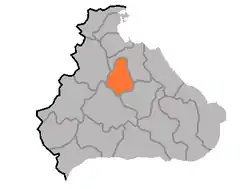Kosan County
고산군 | |
|---|---|
| Korean transcription(s) | |
| • Chosŏn'gŭl | 고산군 |
| • Hancha | 高山郡 |
| • McCune-Reischauer | Kosan-gun |
| • Revised Romanization | Gosan-gun |
 Map of Kangwon showing the location of Kosan | |
| Coordinates: 38°54′10.01″N 127°25′26.00″E / 38.9027806°N 127.4238889°E | |
| Country | North Korea |
| Province | Kangwŏn Province |
| Administrative divisions | 1 ŭp, 24 ri |
| Area | |
| • Total | 435 km2 (168 sq mi) |
| Population (2008[1]) | |
| • Total | 103,579 |
| • Density | 240/km2 (620/sq mi) |
Kosan County is a kun, or county, in Kangwŏn province, North Korea.
Physical features
The county is largely mountainous. The central area forms a basin. The county's highest point is Chuaesan. Major streams include the Namdaech'ŏn, Ryongjiwŏnch'ŏn, and Namsanch'ŏn. There are a total of 13 reservoirs. Forestland makes up some 63.8% of the county's area.
Administrative divisions
Kosan county is divided into 1 ŭp (town) and 24 ri (villages):
|
|
Economy
Agriculture
Agriculture dominates local industry in Kosan, with crops including rice, maize, millet, wheat, barley, soybeans, and red beans. The region is particularly noted for its abundant production of fruit.
Mining
Mining is widely developed, exploiting the local deposits of gold, silver, copper, iron, limestone, lead, zinc, gypsum, and other minerals.
Transport
Kosan county is served by the Kangwŏn Line of the Korean State Railway.
